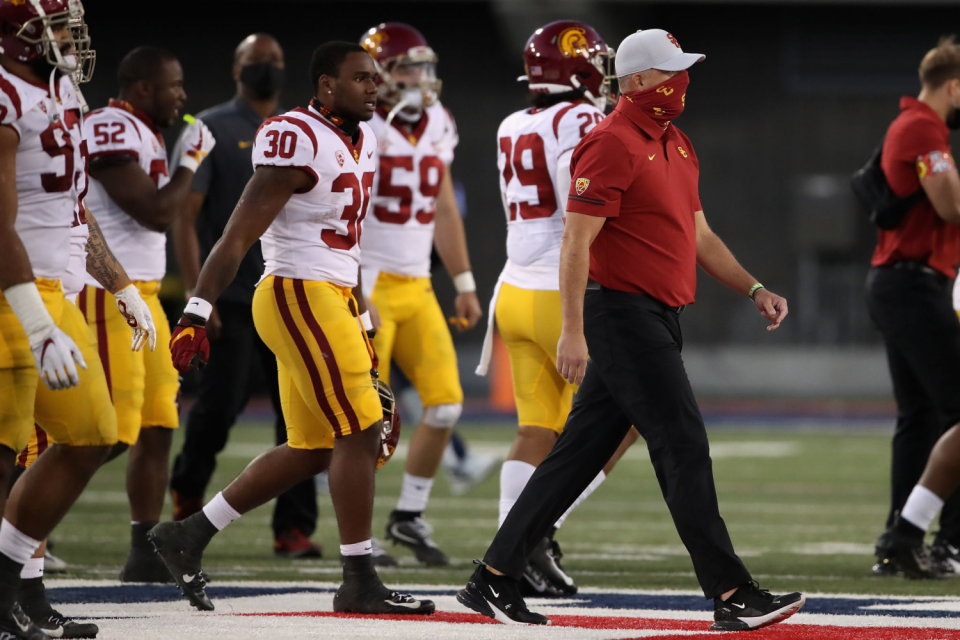USC eager to see improvement in rushing game against Utah

A few yards from pay dirt last Saturday, quarterback Kedon Slovis hurried USC’s offense to the line. It was fourth down and short late in the third quarter, yet another pivotal short-yardage scenario, and Slovis stood back in shotgun alongside Markese Stepp, whose penchant for plowing through contact made him the ideal back for picking up a yard.
But as soon as the ball was snapped, Stepp was besieged in the backfield. A flurry of missed blocks and miscommunication saw USC’s drive stopped deep in Arizona territory, its volatile ground game grounded yet again.
That result has been far too common for comfort through two weeks, even as both games ended with narrow comeback victories. USC (2-0), which plays at Utah on Saturday, has so far converted just one third down via rush this season — on a 24-yard Slovis scramble against Arizona State — while three attempts on fourth-and-short have been stuffed behind the line.
Those issues have already left plenty of points unclaimed through two games. And this week, against the Pac-12’s top rushing defense — and offense — from 2019, a few extra yards on the ground could mean the difference between a disappointing season and a conference title appearance.
Utah has yet to play a game this season because of coronavirus-related cancellations, but in four of the last five seasons, no Pac-12 defense has allowed fewer rushing yards. The Utes have held opposing offenses to just 3.42 yards per carry during that five-year span. Over the last two, they’ve been even more stout, finishing fifth and eighth in the nation, respectively.
That unit may not be so impenetrable this season with Utah set to replace nine defensive starters from 2019. But it does return its leading tackler, linebacker Devin Lloyd, and one of its top defensive lineman, Mike Tafua. USC struggled last week to find room against an Arizona defense previously ranked among the worst in the league.
How the Trojans plan to resolve those rushing woes is unclear. But even before the season, USC coach Clay Helton understood that a lackluster ground game was holding back an otherwise explosive offense. The Trojans ranked 119th in rushing last season, averaging just 118 yards per game.
“We needed to run the ball better,” he said. “That was a primary focus for us.”
Helton went so far as to use a graph to illustrate that disparity to his assistants. Included with USC were perennial powers Alabama and Louisiana State, both of whom ranked among the top-five passing offenses last season. The Trojans ranked sixth.

As Helton saw it, the glaring difference between those three offenses was on the ground. Both Alabama and LSU rushed for at least 50 more yards per game than USC last season.
“That helps a quarterback,” Helton said. “That helps maybe five to six drives and takes some pressure off.”
Through two games, both Helton and offensive coordinator Graham Harrell seem happy enough with the help they’ve received. Harrell credited the run game for keeping USC afloat against Arizona, while Helton pointed to USC’s yards-per-carry average last Saturday as a sign of progress.
“I think a lot of teams would love 5.6 a carry,” Helton said.
But those efficiency numbers were largely propped up by three long runs — a 49-yard sprint from Stepp and rushes of 37 and 19 yards from Stephen Carr. The Trojans' other 29 attempts averaged just 2.34 yards each.
Against Utah, that would actually qualify as a high-water mark for USC. Over their last two meetings, the Trojans' 53 rushing attempts have gone for just 86 yards — or 1.62 per carry.
That was enough last year for backup quarterback Matt Fink to lead an improbable upset at the Coliseum. In Salt Lake City, where USC hasn’t won since 2012, the Trojans are far less likely to weather a stalled run game.
The same, though, could be said for Utah, which must replace Zack Moss, the Pac-12’s leading rusher from last season who now plays for the NFL's Bills. The Utes had 81 more rushing attempts than any other team in the conference in 2019, and despite losing Moss, it’s unlikely they’ll alter that approach much.
“These guys are going to run the football right at us,” defensive coordinator Todd Orlando said this week.
In a shortened season, the better of those two ground games could be well on its way to running away with the division. Even Helton acknowledged those stakes.
“Whoever has won the Pac-12 South,” he said, “it usually goes through this game.”
This story originally appeared in Los Angeles Times.

